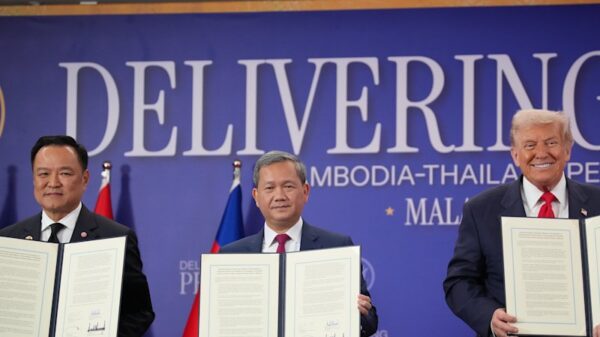Relations between the United States and Canada have taken a significant downturn as US President Donald Trump announced the termination of trade negotiations. This decision follows Trump’s accusations that Canada interfered in American democracy through a controversial television advertisement featuring audio and footage of former President Ronald Reagan. The ad, which criticizes tariffs and trade barriers, prompted Doug Ford, the premier of Ontario, to announce on Saturday that he would pull the ad in hopes of resuming trade discussions.
In his late-night social media posts, Trump expressed strong disapproval of the advertisement, labeling it as “FAKE” and asserting that it misrepresented Reagan’s views on tariffs. He stated, “CANADA CHEATED AND GOT CAUGHT!!!” and claimed that the ad falsely portrayed Reagan as being opposed to tariffs, when, in fact, he supported them for national security purposes. The ad was part of a $75 million campaign aimed at influencing public opinion in the US, particularly in Republican districts, as it aired during high-profile events, including the World Series.
The Ronald Reagan Presidential Foundation has indicated that it is reviewing potential legal actions against the Ontario government for the use of selective clips from Reagan’s 1987 speech. In that speech, Reagan defended his decision to impose tariffs on Japan, citing unfair trade practices.
Trump’s decision to halt trade talks comes after a meeting with Canadian Prime Minister Mark Carney in early October, where discussions had focused on the ongoing tariffs on Canadian steel, aluminum, and vehicles. These tariffs have been a significant point of contention, with Canada seeking relief, arguing they have adversely affected its economy.
In a response to the escalating tensions, Ford decided to pause the advertisement campaign after discussions with Carney, aiming to prevent a further crisis. He commented, “Our intention was always to initiate a conversation about the kind of economy that Americans want to build and the impact of tariffs on workers and businesses.” The Ontario government had initially planned to continue airing the ad, which they believed would stimulate important conversations about economic policies.
While Ford attempts to smooth over relations with the US, Carney is looking beyond the current crisis. As he departed for the ASEAN and APEC summits, he emphasized the need for Canada to diversify its trading relationships, particularly with Asian economies. “We can’t control the trade policy of the United States,” Carney stated. “What we can control… is developing new partnerships and opportunities.”
During this period of strained relations, the comments of Pope Leo XIV also highlighted the situation. In a recent meeting at the Vatican, the Pope expressed concern over the deteriorating relationship between the two nations, stating, “Canada and the United States … are experiencing great difficulties.” His remarks underscored the historical ties that have traditionally characterized US-Canada relations.
As tensions continue to rise, the future of trade discussions remains uncertain. Both leaders will be attending international summits, where further discussions on trade policies may occur. The outcome of these negotiations could have significant implications for both countries, particularly in the wake of ongoing challenges within the global economy.





























































